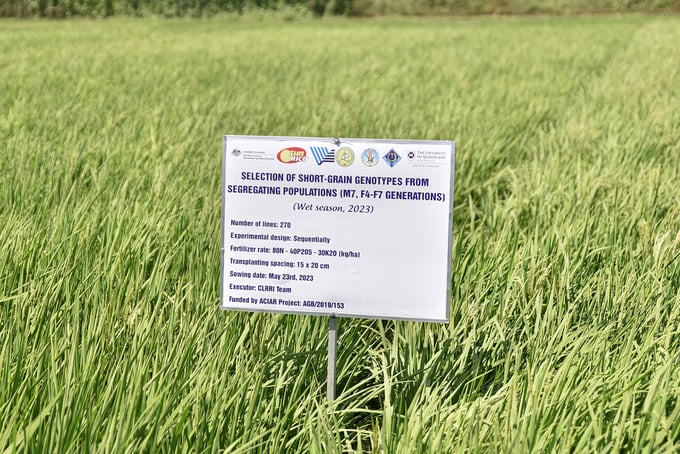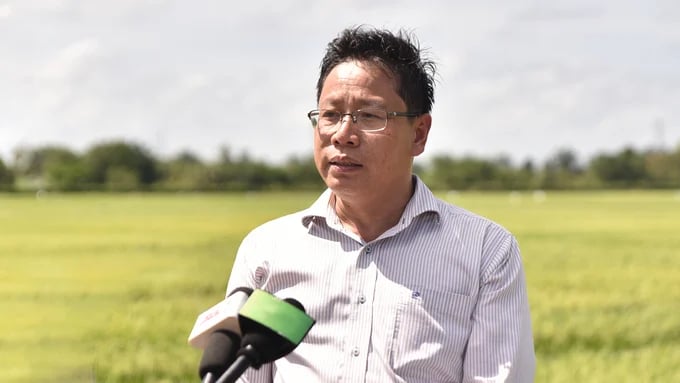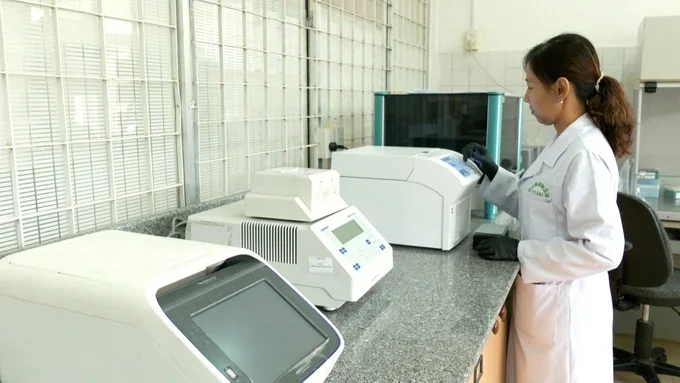June 14, 2025 | 21:44 GMT +7
June 14, 2025 | 21:44 GMT +7
Hotline: 0913.378.918
June 14, 2025 | 21:44 GMT +7
Hotline: 0913.378.918

Rice varieties developed by the Cuu Long Delta Rice Research Institute now dominate a significant portion of rice production in the Mekong Delta. Photo: Quynh Chi.
Throughout its development, the Cuu Long Delta Rice Research Institute has achieved remarkable milestones in rice breeding through the application of science and technology. Starting with limited resources, the Institute has progressively adopted hybridization methods alongside mutation technologies, supported by infrastructure investments and staff training in new technologies.
Over time, the Institute has advanced in tissue culture, molecular markers, gene selection, and gene editing. These scientific advancements have facilitated the identification and selection of superior rice varieties, leading to improvements in productivity and quality.
The integration of traditional breeding methods with molecular markers has significantly enhanced efficiency in breeding processes. This approach not only helps identify crucial traits but also reduces the time required compared to conventional methods.
As a result of these achievements, the Institute's rice varieties have become widespread and are now crucial to rice production in the Mekong Delta.

Director of the Cuu Long Delta Rice Institute, Tran Ngoc Thach, emphasized the necessity of investing in basic research to foster new breakthroughs in rice science. Photo: Quynh Chi.
However, in the current context, scientific research in Vietnam largely revolves around adapting and adopting foreign scientific advancements to local conditions. The stages of passive adoption or self-reliance have gradually reached their limits. Therefore, there is an urgent need for deeper investment in basic research to bolster the Institute's capacity for independent scientific exploration.
Currently, according to the Director of the Cuu Long Delta Rice Institute, understanding a trait requires analysis of genetic resources and databases, areas where we face shortages. Moving forward, instead of focusing solely on applied research, investing in basic research is crucial to fostering new advancements.
While the Institute continues to engage in applied research in collaboration with businesses and localities to develop practical products, there is also a need for businesses to invest in basic research to drive new discoveries, conduct further research, and apply findings in practical settings.
Increased investment in basic research will empower the Cuu Long Delta Rice Research Institute and the broader Vietnamese agricultural sector to achieve greater self-sufficiency in breeding and enhance competitiveness in the international market.
In terms of connecting, collaborating, and implementing scientific research outcomes, the Cuu Long Delta Rice Research Institute has transitioned from a subsidized model to an autonomous one. Alongside other public entities nationwide, the Institute is moving toward financial self-sufficiency.

Biotechnology applications in rice breeding are a focal point in the scientific research activities of the Cuu Long Delta Rice Research Institute. Photo: Kim Anh.
An important aspect to address is the transfer of research results. Previously, intellectual property and copyright management received insufficient attention, with research primarily funded by state budgets within public service units. The rise of public-private partnerships has introduced new opportunities, fostering increased involvement from economic and social sectors.
The approach to transferring results has begun to evolve, with the Institute gradually adapting to this shift. Today, the traditional method of manually transferring varieties to local government agencies has given way to new forms of collaboration involving multiple stakeholders from economic and social sectors.
Consequently, the Mekong Delta Rice Research Institute has revised its product selection process for transfer, focusing on products that align closely with production practices. For acceptance by businesses, products must demonstrate high practical applicability, address real-world challenges, and possess commercialization potential.
On the afternoon of July 10, the Ministry of Agriculture and Rural Development organizes a forum to connect agricultural science and technology products with businesses, cooperatives, and the public. Minister of Agriculture and Rural Development Le Minh Hoan and Deputy Minister of Agriculture and Rural Development Phung Duc Tien co-chair the forum.
Attending the forum are leaders of units under the Ministry of Agriculture and Rural Development, research institutes, schools affiliated with the Ministry, enterprises, cooperatives, and international organizations related to the agricultural sector. The forum is conducted in a question-and-answer format, directly addressing queries from delegates. Reports are presented, introducing the Ministry's policies for encouraging research and innovation in science and technology, showcasing the achievements, and highlighting successful examples of science and technology product transfers into production.
Translated by Quynh Chi
![Turning wind and rain into action: [4] Bringing climate bulletins to remote and isolated areas](https://t.ex-cdn.com/nongnghiepmoitruong.vn/608w/files/linhnhp/2025/06/14/1152-z6704423696987_15fd32ffc26d590d204d520c9dac6786-nongnghiep-151141.jpg)
(VAN) The Vietnam Agriculture and Nature Newspaper interviewed Mr. Vu Thai Truong, Acting Head of Climate Change and Environment at UNDP Vietnam, to gain deeper insight into how climate bulletins are delivered to farmers.

(VAN) In Tien Giang, a high-tech shrimp farm has developed a distinctive energy-saving farming model that has yielded promising results.
![Turning wind and rain into action: [3] 300.000 farmers benefit from agro-climatic bulletins](https://t.ex-cdn.com/nongnghiepmoitruong.vn/608w/files/news/2025/06/12/e5a48259d6a262fc3bb3-nongnghiep-125122.jpg)
(VAN) The agro-climatic bulletin has become a valuable tool for farmers in the Mekong Delta. After more than five years of implementation, the initiative is gradually being expanded nationwide.
![Turning wind and rain into action: [2] Providing forecasts to the people](https://t.ex-cdn.com/nongnghiepmoitruong.vn/608w/files/news/2025/06/12/e5a48259d6a262fc3bb3-nongnghiep-103927.jpg)
(VAN) In addition to improving the quality of hydrometeorological forecasts, putting forecast bulletins into practical use is crucial for production and disaster prevention.

(VAN) Blue carbon is receiving attention for its rapid absorption capacity and vast potential. It represents a promising nature-based solution to respond to climate change.
/2025/06/11/3507-1-161904_583.jpg)
(VAN) Seagrass beds and coral reefs serve as 'cradles' that nurture life in the ocean depths, creating rich aquatic resources in Vietnamese waters.
![Turning wind and rain into action: [1] Forecasting for farmers](https://t.ex-cdn.com/nongnghiepmoitruong.vn/608w/files/news/2025/06/11/e5a48259d6a262fc3bb3-nongnghiep-111919.jpg)
(VAN) Weather is no longer just a matter of fate. Forecasts have now become an essential companion for farmers in every crop season.